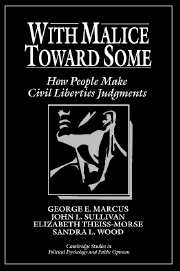Book contents
- Frontmatter
- Contents
- List of Figures and Tables
- Preface: Political Tolerance and Democratic Life
- PART I Theoretical Background and Overview
- PART II Contemporary Information and Political Tolerance Judgments
- PART III Refining the Model – The Role of Antecedent Considerations as Individual Differences
- 5 Threat and Political Tolerance
- 6 Democratic Values as Standing Decisions and Contemporary Information
- 7 Source Credibility, Political Knowledge, and Malice in Making Tolerance Judgments – The Texas Experiment
- 8 Individual Differences: The Influence of Personality
- PART IV Implications and Conclusions
- Appendix A: Hypothetical Group Scenarios and Manipulations
- Appendix B: Methodological Approaches and Scales
- Notes
- References
- Index
6 - Democratic Values as Standing Decisions and Contemporary Information
Published online by Cambridge University Press: 05 August 2012
- Frontmatter
- Contents
- List of Figures and Tables
- Preface: Political Tolerance and Democratic Life
- PART I Theoretical Background and Overview
- PART II Contemporary Information and Political Tolerance Judgments
- PART III Refining the Model – The Role of Antecedent Considerations as Individual Differences
- 5 Threat and Political Tolerance
- 6 Democratic Values as Standing Decisions and Contemporary Information
- 7 Source Credibility, Political Knowledge, and Malice in Making Tolerance Judgments – The Texas Experiment
- 8 Individual Differences: The Influence of Personality
- PART IV Implications and Conclusions
- Appendix A: Hypothetical Group Scenarios and Manipulations
- Appendix B: Methodological Approaches and Scales
- Notes
- References
- Index
Summary
Clearly the American civil liberties record has deep flaws in it, especially in social and racial justice and toleration of radical political expression, and clearly the record is not as pristine as American ideals are. Yet it must also be remembered that the record would probably not be as good as it is if American ideals were not so high, for they act as a constant standard and constant challenge.
Robert Justin Goldstein (1987)The study of political tolerance remains intriguing, to a great extent, because of a paradox found repeatedly in empirical studies. Americans express strong support for abstract ideals such as free speech and minority rights. The standing decision on democratic principles, absent any context, seems to be one of tolerance. Yet, when faced with unpopular groups exercising particular rights in a particular situation, many people want to limit the freedom of such groups. Everyone should have a right to march to express their political ideas, but not the Nazis in Skokie – or a group I dislike in my town! This disparity could occur because decisions about particular groups conflict with standing decisions about democratic values. It could also occur because contemporaneous information about a particular group and its behavior lead people to arrive at judgments that differ somewhat from their standing decision.
In this chapter, we begin to take seriously that most people actually believe their expressions of democratic ideals.
- Type
- Chapter
- Information
- With Malice toward SomeHow People Make Civil Liberties Judgments, pp. 114 - 132Publisher: Cambridge University PressPrint publication year: 1995



